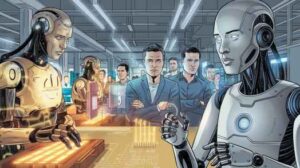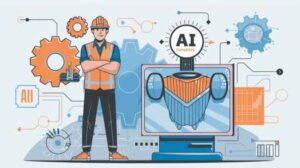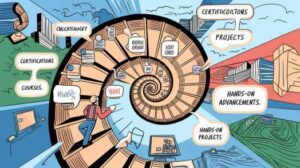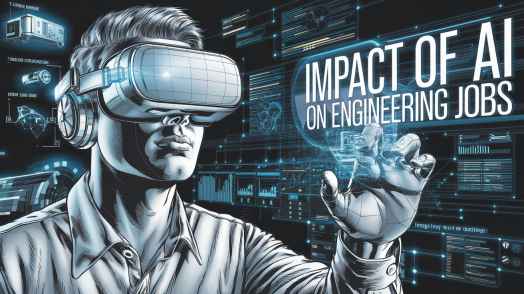Introduction
A world where machines do the tough stuff in engineering, letting humans handle the cool problem-solving. This isn’t sci-fi; it’s almost here! AI is changing industries super fast. For engineers, this brings both excitement & some worry. Sure, AI means new ideas, yet it also puts old-school engineering jobs at risk. But here’s the good part—upskilling can protect you. We’ll dive into how AI affects engineering jobs, why learning new things is super important, and give you tips to stay ahead in an AI-powered world.
The Growing Fear of AI-Induced Job Losses
The automation wave is here—are engineers at risk of being swept away?

In the age of automation, many engineers are worried about job loss. A recent report shows that more than 67% of engineers believe AI is hurting their jobs. As AI gets better at handling tasks like data analysis, design optimization, & even some decision-making, the need for engineers in traditional roles is shrinking. Things that humans once did can now be done faster and more correctly by machines.
Estimates say 20-40% of engineering tasks might be automated in the next ten years. Engineers working on routine tasks are the most at risk. But does this mean the end of engineering careers? Not really. Instead, it shows a need to adapt.
Why Engineers Must Upskill to Stay Competitive
Standing still in the tech world? It’s just not an option anymore.

As AI evolves and grows, engineers must keep up. Think about it: A whopping 87% of engineers know that upskilling is key to their success. Today, if you’re an engineer with advanced skills in AI, machine learning (ML), and data analytics, you’re in high demand. Mastering these skills allows engineers to go beyond routine tasks. They get to manage, supervise, and boost AI systems.
But it’s not only about knowing how AI works. It’s also about using AI tools to spark innovation! Engineers who dive into AI and ML will be at the forefront of future advancements. On the other side, those who shy away from change? Well, they might get left behind.
The Engineering Employment Gap
Are our engineering colleges preparing graduates for this AI-driven workforce?

There’s a big skills gap in the engineering world. A report by Great Learning says only 46% of engineering graduates in India are employable. Why? Because their academic programs are outdated and don’t meet what industries need now.
Traditional engineering colleges often stick to theory. But nowadays, with AI, you need practical skills too.
Companies want engineers who have hands-on experience with AI projects. They need folks who can solve real-world problems & work with the latest technologies. Sadly, many graduates aren’t ready for this fast-changing environment because of old teaching methods.
But there’s hope! Upskilling can bridge this gap. It equips engineers with the Must-Have Skills for today’s AI-driven job market.
What Skills Will Keep Engineers Relevant in an AI-Driven World?
AI might be clever, but there are things it can’t do—yet AI keeps growing in the engineering world, and some skills will become super important. Engineers who want to stay on top need to develop abilities that AI can’t easily copy, like creativity, critical thinking & solving tricky problems. These human traits, mixed with know-how in AI, ML, and data crunching, will help engineers shine in jobs that AI systems can’t take over.

Instead of being scared of AI, engineers should think about how to work together with these machines. By adding AI to their toolset, they can take on more strategic roles. This means managing AI operations and making creative choices that need a human touch.
The Lifelong Learning Mindset
You know, in the age of AI, learning just ends when you graduate. No, it has to go on and on.

AI is moving forward so fast that learning has to be something we do all the time. Engineers who promise to keep learning will do better in this changing world. They should take special courses, get certifications, and do hands-on projects in AI fields. These things give them the need to stay important. Engineers investing their time in these areas are getting more job offers already! Especially from cool companies that are leading in AI technology.
But you know one thing, upskilling isn’t just something you do once. It’s a career-long thing. By keeping their knowledge and skills fresh regularly, engineers can keep up with the job market that changes a lot and grab new chances as they come up.
Conclusion
AI is changing how the engineering world works, but there’s a silver lining for folks ready to adapt. Upskilling in AI, machine learning, & data analytics is the way to keep up and thrive in this new era. By embracing continuous learning, engineers can secure their jobs and take advantage of all the exciting opportunities that AI brings.
FAQs
1. Will AI replace all engineering jobs?
AI will automate certain tasks, but engineers with creative & complex problem-solving skills will always be needed to oversee and improve AI systems.
2. What are the best areas for engineers to upskill in?
Key areas include artificial intelligence, machine learning, data analytics, and systems integration—skills that go hand in hand with AI technologies.
3. How can I start upskilling in AI as an engineer?
You can take online courses or attend workshops. Pursue certifications or gain hands-on experience by working on AI-related projects.
4. Why is continuous learning important for engineers?
The pace of tech change is super fast. To stay competitive, engineers must keep on learning and adapting to new tools, systems (and innovations).
5. Can AI create new engineering roles?
Yes, AI is expected to create new roles focused on integrating, supervising & optimizing AI systems. This opens up fresh opportunities for engineers.
